|
|
|
|
| |
|
|
 |
We
accept
Visa, Mastercard,
and American Express. |
 |
  |
 |
| |
 |
| |
|
|
 |
DRCELL Turmeric Extract (120 Capsules)
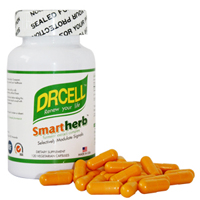
Turmeric is Curcuma Genus (Curcuma) dried roots
of perennial plant herbs turmeric (Curcuma longa L.). In Asian turmeric
rhizomes (underground stems) or root has been used in cooking, medicine,
cosmetics for over 2,000 years. Marco Polo wrote turmeric in his memoirs
promote its popularity as a drug in the European Middle Ages.
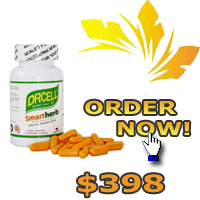
In Asia, turmeric has long been used to treat
gastrointestinal discomfort, arthritis pain, and "low energy (fatigue)."
In India traditional Ayurvedic medicine, turmeric has been used as a
digestive and liver tonic, eliminate worms, strong body, dissolve
gallstones, menstrual disorders and arthritis. In the old Hindu
scriptures, it is described as aromatic, stimulant, carminative (a kind
of exhaust gas from the intestine and colic).
In 1815, Vogel and Pelletier
firstly isolated "yellow pigment" from plant roots of turmeric, named
"curcumin." In 1985 curcumin was firstly certificated that it can
inhibit tumor cell growth.
During the late 30 years, curcumin research spread
throughout the world. According to NaturalNews, after analyzing millions
of research papers, curcumin, the main active ingredient of turmeric, is
the most modern scientific research phytochemicals.
Scientific Research:
Cancer is a group of over 200 neoplastic
diseases,all of which are caused by the dysregulation of multiple cell
signaling pathways. A cancer may have as many as 500 different
dysregulated genes. The dysregulation of various genes may occur over
a period as long as 20-30 years before a given cancer begins to
manifest its symptoms. Therefore, targeting or inhibiting a single
gene product or cell signaling pathway is unlikely to prevent or
destroy cancer.
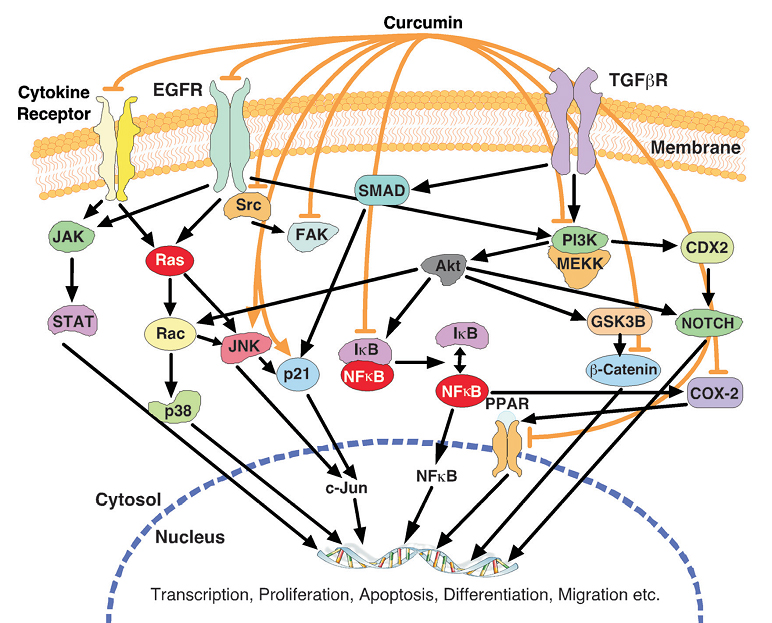
Curcumin
can target seven major target group, 86 cancer-related targets, these
targets linked to inflammation and to survival, growth, invasion,
angiogenesis, and metastasis of cancer cells.Among them, 23 targets
are listed correspondence in anti-cancer drugs approved by the FDA,
another 63 cancer-related targets are not listed correspondence there
in FDA approved anticancer drugs. Meanwhile, curcumin targeted to
remove cancer stem cells. replica watches uk, replica watches uk, rolex replica sale
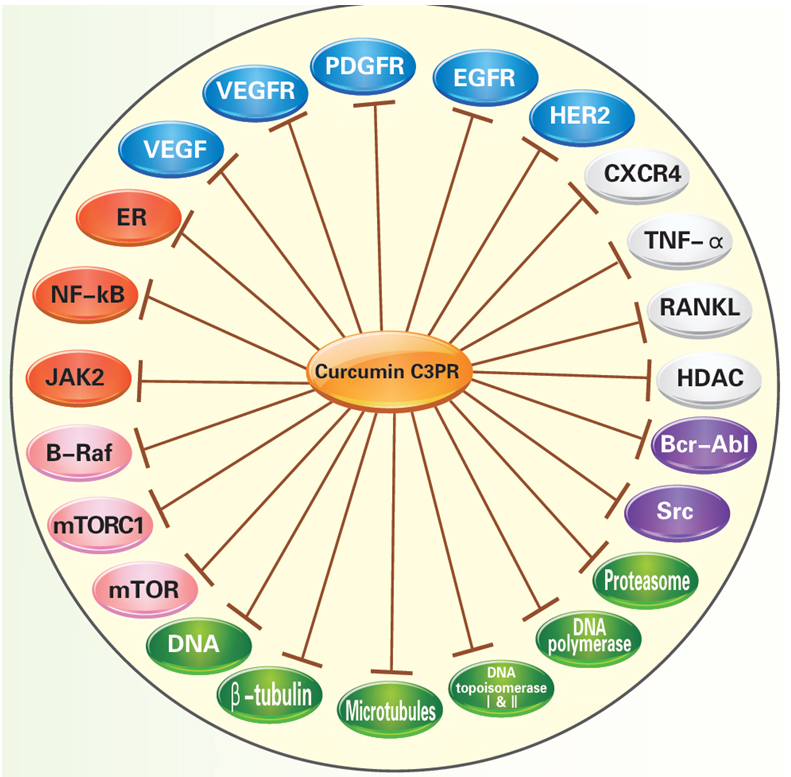
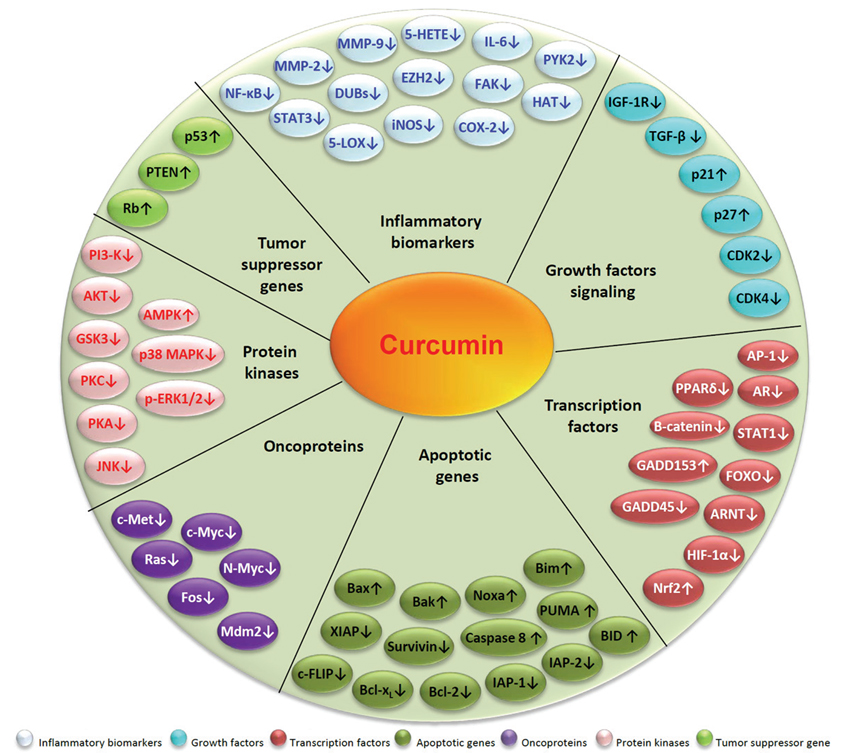
 |
"Curcumin can
selectively modulate multiple cell signaling pathways linked
to inflammation and to survival, growth, invasion,
angiogenesis, and metastasis of cancer cells. More clinical
trials of curcumin are needed to prove its usefulness in the
cancer setting." - Bharat B. Aggarwal,Ph.D.
Cytokine Research
Laboratory, Department of Experimental Therapeutics, The
University of Texas MD Anderson Cancer Center Chief
Scientist, Professor, Distinguished Professor of Cancer
Research |
 |
"In clinical pilot
studies in Taiwan and India, curcumin has been associated with
regression of premalignant lesions of the bladder, soft
palate, stomach, cervix, and skin, and with treatment
responses in established malignancy." -William
P. Steward,Ph.D.
Department of Cancer Studies & Molecular
Medicine, The University of Leicester
Head of Department,
Professor, Chair of the NCRI Colorectal Cancer Clinical
Studies Group
|
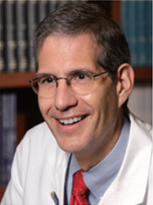 |
"The putative
anticancer mechanisms of curcumin include up-regulation of
carcinogen-detoxifying enzymes such as glutathione
S-transferases, antioxidation, and suppression of the
isoenzyme cyclooxygenase-2." -Francis
M. Giardiello,M.D.
School of Medicine, Johns Hopkins
University, USA
Pharmacy professor, Oncology professor,
Pathology professor
|
Main Ingredients:
Turmeric Extract
(Curcuma longa) (standardized to 95%
curcuminoids)(rhizome)
Curcumin C3 Complex?
Curcumin C3 Complex?is the trademark of Sabinsa.
Curcumin C3 Complex?is
extracted by the United States Patent Technology (US 5861415).
Curcumin C3 Complex?contains three natural ingredients: curcumin
(89-91%), desmethoxycurcumin) (6-9%), bisdesmethoxycurcumin) (1-3%).
Its purity is over 95%, the absorption rate increased by 20-fold.
References:
1.
Bharat B Aggarwal,Yaung-Joon Surh,Shishir Shishodia. Advances in
experimental medicine and
biology, Volume 595, The Molecular
Targets and Therapeutic Uses of Curcumin in Health and Disease.
2.
Subash C Gupta, Sridevi Patchva,et al.Clin Exp Pharmacol Physiol.
2012,39(3): 283–299.
3. US 5861415.
4. Marie-Hélène Teiten,
Serge Eifes,et al. Toxins ,2010, 2:128-162
5. Guido Shobal, David
joy,et al. Planta Medica , 1998,64: 353—356.
6. Noor Hasima and
Bharat B Aggarwal. Int J Biochem Mol Biol 2012;3(4):328-351.
7. Ricky A.Sharma,Stephanie A.Euden,et al. Clinical Cancer Research,2004,10:6847-6854.
8. Marcia Cruz–Correa, Francis M. Giardiello,et al. CLINICAL GASTROENTEROLOGY AND HEPATOLOGY,2006,4:1035-1038.

|
 |
 |












